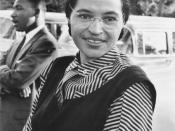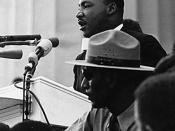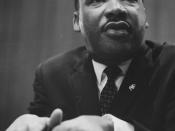An Untimely Community
In a time of hate and distrust it is sometimes necessary for one man to step in and provide arguments for new ideas. Birmingham, Alabama felt this hate and distrust between people of black and white heritage in the early 1960's. Holding segregation and police brutality as part of the ideals in the community, one man saw the need for reform. Martin Luther King Jr. responds to the "Public Statement by Eight Alabama Clergymen" with his document, "Letter from Birmingham Jail". King argues for a new community of equality by citing problems with the white church, identifying the Negro communities struggle with the "white moderate", and arguing against segregation.
King argues for a new community challenging the lack of leadership in the white church. His argument develops in response to the clergymen's statement, "when rights are consistently denied, a cause should be pressed in the courts and in negotiations among local leaders, and not in the streets" (652).
King tries to establish an ideal community where the white church shows support for the Negro church in all non-violent actions promoting integration. King uses the metaphoric statement, "standing as a tail light behind other community agencies rather than a headlight leading men to higher levels of justice" (663), to express his desire for the leaders of the white church to step into the public eye and encourage integration along with all acts necessary for an equal community. King feels the leadership in the church lacks support for his movement stating, "all too many others have been more cautious than courageous and have remained silent behind the anesthetizing security of stained glass windows"(663). King furthers his argument for leadership asking the clergymen to shed the safety of their white community church and become courageous in the cause...


